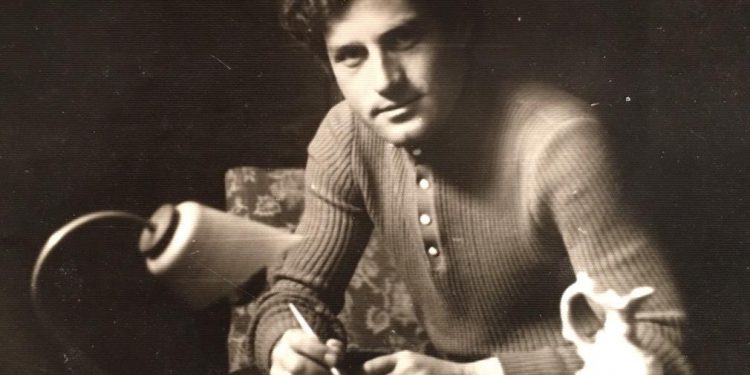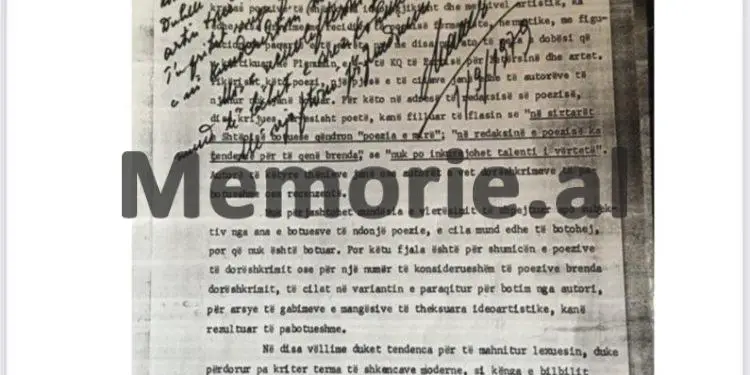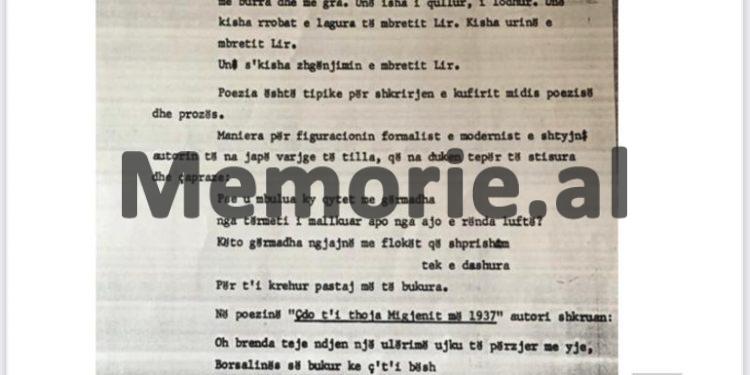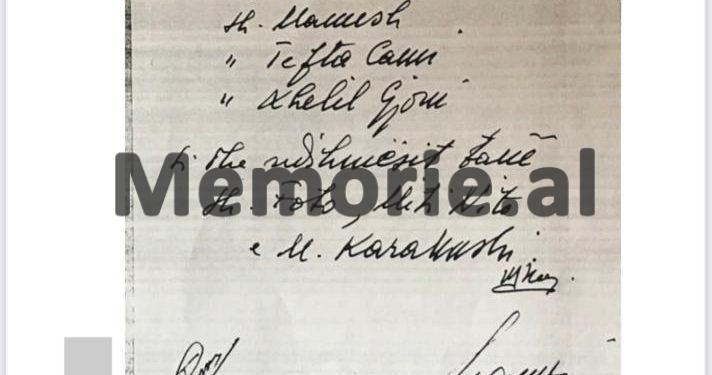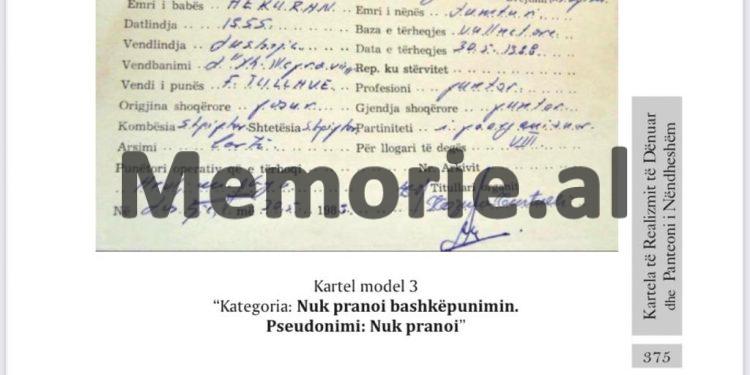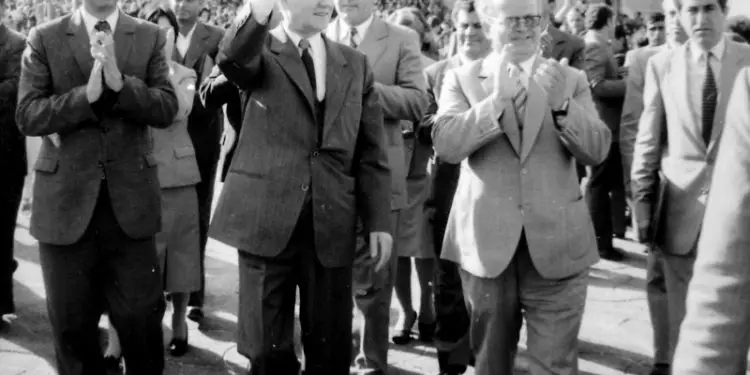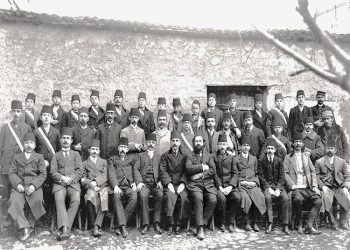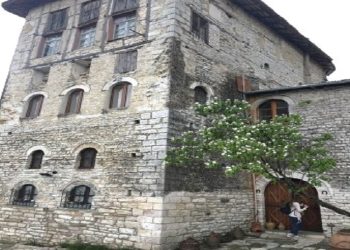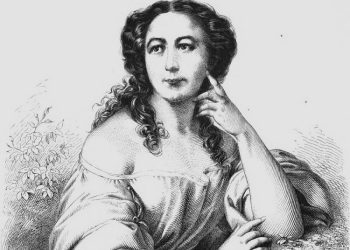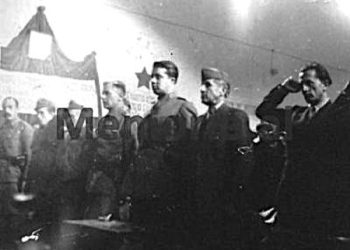Dashnor Kaloçi
Memorie.al publishes some unknown documents extracted from the Central State Archive in Tirana (Fund of the former Central Committee of the ALP), which belong to 1979, where the Chief of Press in the apparatus of the Central Committee of the ALP , Miti Tona, through an information report, on the topic “On some problems of manuscripts in poetry”, sent to Ramiz Alia, among other things stops at the poetic volumes of four ports: Agim Gjakova, Rudolf Marku, Agim Isaku and Visar Zhiti, analyzing in detail and detail their poems, because according to him, among them there were “modernist poems, hermetic and with pronounced ideological errors”, etc. The report-information of the Press Chief of the Central Committee was seen by Ramiz Alia, who put the relevant notes, where among other things it is said: “Talk to sh. Dritëro Agolli, to organize in the League, a creative discussion on these problems and specifically on these “poems” and others like these. They should be strongly criticized as foreign to our art. No concessions should be made. To give way to such perverted efforts and contrary to socialist realism. Do not underestimate this issue as it can become dangerous. “Let me know the end.”
As we have seen in many other documents published in the pages of this book and not only, the Publishing House “Naim Frashëri”, the League of Writers and Artists of Albania, the Ministry of Education and Culture, the Arts Committee, etc., from time to time sometimes they sent to the Central Committee of the ALP, reports, information and various relations related to artistic creativity, mainly those of the artistic book and other publications that these covered in an official way. This, the dictatorship exercised by the communist regime towards writers and artists, has been permanently evident since the establishment of the League, but was established as a rule mainly from the beginning of 1973, when Enver Hoxha issued the first criticism of the 11th Festival of Radio Television, which preceded a real storm on writers and artists, many of whom led by the two main bosses, Fadil Paçrami and Todi Lubonja, ended up in prisons and internments of the communist regime, and many others were dismissed from the positions and positions they held and sent “to be educated among the working class.”
In this context, in the continuation of informing the Central Committee of the ALP regarding the problems of publications that concerned that sector, at the end of July 1979, the head of the press at that apparatus, Miti Tona, sent to his superiors an eight-page report entitled “On Some Problems of Manuscripts in Poetry.” As we will see from the document in question, the problem that arises there is not related to the published artistic creativity, but to the volumes that have long been lying in the drawers of the Publishing House “Naim Frashëri” and did not see the light of publication, as they were considered with “ideological errors”! Among these volumes, the head of the press in the Central Committee of the ALP, has chosen as “the most problematic” the books of four well-known authors such as: Agim Gjakova, Agim Isaku, Rudolf Marku and Visar Zhiti, where the latter was a young poet from the province (his half-exiled family in Lushnje) and had neither the name nor the fame of his three colleagues, who had published books with their creativity for years.
But strangely as we will see from the document with the report-information in question, he (Zhiti), would suffer more than three of his colleagues in that report-information, even ending up behind bars in prison. In the analysis of the poems of these four authors, (which was most likely made by the critics or editors of the Publishing House “Naim Frashëri”), the head of the press in the Central Committee of the ALP, Miti Tona, as a real literary critic, has analyzed in detail up to artistic figurations some of their poems, considering them with ideological and unpublishable problems. What stands out is the fact that: although his report (Miti Tona), is not very harsh, even compared to many reports, information and reports that contain other documents that we have published in the pages of this book and not only , is somewhat mild and at the end of it, he informed his superiors that: “Despite these shortcomings, on the whole our poetry has sound ideological content, is strongly based on the teachings of the Party and Comrade Enver and fulfills his mission with dignity “.
So, in that report it seems that the positive side of the problem prevails, which has been treated and taken into analysis, or as it was commonly said at that time in various reports (not only those of literature and arts), that: “the general is positive”. But apparently, Ramiz Alia, the secretary of the Central Committee of the ALP that covered arts, culture and propaganda, was not of that opinion, who in the report-information in question (on the first page), among other things, wrote “They should be strongly criticized as foreigners for our art. No concessions should be made. To give way to such perverted efforts and contrary to socialist realism. Do not underestimate this issue as it can become dangerous. “Let me know the end.” In addition to this note, on the front page of the document which has been a well-known practice for all party and state officials to whom it was addressed, what is noticed in that written correspondence of Ramiz Alia with his subordinates, (such as Jakup Mato, Miti Tona etc.) is also a letter almost one page with a long note of it, where in the last sentence, he (Ramizi) wrote: I agree with the proposed measures. To be implemented. For someone and take this problem to the end, together with other organizations “.
Which seems to have been fatal for the young poet Visar Zhiti, as not only was he not published the volume of poetry he had sent since 1972 to the Naim Frashëri Publishing House, but he ended up behind bars, accused of being “enemy of the people” and precisely for those poems…! Another thing that is noticed from the relevant facsimiles of these archival documents that we are publishing for the first time in this part of the book, is the fact that in the written correspondence for the report-information in question, where the poems of Zhit and three colleagues are analyzed. of him, in a cover letter that finally bears the signature of Ramiz Alia, (who in those days left for Paris to accompany the seriously ill Hysni Kapo), that day almost half of the Politburo have signed as: Hekuran Isai, Simon Stefani, Manush Myftiu, Foto Çami, Xhelil Gjoni and Miti Nito and Mehmet Karakushi, instructors in the Central Committee for Art, Culture and Propaganda. This letter was originally sent by Ramiz Alia only to Hekuran Isa and Simon Stefani, the two newly elected secretaries of the Central Committee (then replaced by Hysni Kapo, who had just died), which meant that: with the person mentioned in that report, the organs of the Dictatorship of the Proletariat, such as the State Security, the Investigation, the Prosecution and the courts, which already covered Simon Stefani and Hekuran Isai, were already working.
It is not known exactly why out of those four writers: Agim Gjakova, Rudolf Marku, Agim Isaku and Visar Zhiti, the latter was selected, “to go to the end of the problem”, as Ramiz Alia suggested in his note. This fact, as much as the question mark was raised at that time, becomes as simple and legible when we look and analyze today that we have and know many things that at that time we did not even think about. Because: while Agim Gjakova was of Kosovar origin and in those years official Tirana seemed to be spending “honeymoon” with “Kosovar friends” and Agim Isaku and Rudolf Markun had the support of the famous writer Ismail Kadare, (at that time Kadare went himself in Lezha and talked to the first secretary, Mentor Muça about Rudolf Marku), Visar had no support at all and the only man, Xhevahir Spahiu, who had helped and supported him by publishing some poems in “Nëntori”, was already passing for difficult days themselves, as he was personally criticized by Enver Hoxha.
Likewise, Zhit’s “selection” to be sentenced was probably related to the fact that he was younger than his three colleagues and had no books published, which in a way saved the state, not brought card books and did not remove from circulation textbooks with the names of Gjakova, Isak and Mark. But the most important thing that the three poets escaped from prison bars or internment (like many of their colleagues in those years) and that “luck” fell only to Zhit, was the biographical side, as Visar had a father (Hekuran Zhiti) in prison and one of the uncles, (former teacher since the time of the Monarchy and poet who wrote and published poetry since the early 1930s), who was arrested shortly after the end of the War and died from torture in the cells of the Branch of the Interior of Berat in 1945, without going to court!
This “was enough” that after the note of Ramiz Alia, his subordinates had it easier to “select” him, as it actually happened. But that seems to have been “facilitated” by Visar himself, since from 1973 when he first sent that volume of poetry to the Publishing House “Naim Frashëri”, until 1979 when he was arrested, the editors and the heads of the poetry sector returned it several times “for improvement”, but he not only did not “improve” it, but sent it back to them, with more problems. Which is also quoted in the report-information signed by Miti Tona and that “stubbornness”, Zhiti paid dearly, “going with his feet to prison”! In short, the first and most important reason that Zhiti was being convicted were his own “modernist, hermetic, decadent spirit and ideological errors” poems.
But as the people say, “not every evil comes for bad”, because while during the difficult period of the investigation, Visar wrote the poems in his mind, as the investigator often checked it there as well, saying; “What are you thinking now”, or in the deep gorges of the Spaç or Qafë-Barit mines, where he spent years, hiding the poems in shoelaces or woolen socks that smelled of boots, (since the police sometimes released ”And did not control them properly), because after the 90s, Zhiti became one of the most famous writers and poets, where many of his books have been published and continue to be published and translated abroad and for him there are written not infrequently also the foreign press. For example, the prestigious Italian newspaper, “La Republica”, which in one of its issues in 1998, wrote among other things: “Before this volume was published in Italian in 1998 ‘Writers from prison’ (Feltrinelli), translation of ‘This Prison Where I Live’, published two years ago by Chassell Academic in London, to mark the 75th anniversary of the Pen Club and to commemorate the survival of the many writers who are unjustly convicted during these seventy-five years ”.
Now here is this second summary, which, although titled with an appeal for freedom, has been written again by persons who almost all have lost their freedom for more or less long periods, have suffered imprisonment, torture, arrest or exile. ” . Later in this article of “La Respubblica”, its author quoting the world-famous writer, Umberto Eco, writes: “This book clearly shows the story of Visar Zhit: it was enough to write poems considered by the editors of a publishing house ‘sad and hermetic’, i.e. against the regime. Then, the practice was automatically transferred to the Central Committee of the Albanian party, the Ministry of Interior, and Zhiti rightly won ten years in prison. The point is that poetry frightened authoritarian and dictatorial regimes, even if it speaks, as in the case of Zhit for roses.
This is how the famous writer defined the tragic fate of Zhit under the communist regime, which is also mentioned in these archival documents, which are published for the first time in the pages of this book.
“The documents will be published in abbreviated form, in full in the book ‘Writers and Artists under Communist Dictation’, which is expected to be published soon.”
Report of the Chief of Press in the Apparatus of the Central Committee of the ALP, Miti Tona, for Ramiz Alia
I N F O R M A C I O N
ON SOME PROBLEMS OF MANUSCRIPTS IN POETRY
In recent months, as reported by the directorate of the Publishing House “Naim Frashëri”, she has received several manuscripts of poetry, which in addition to ideologically sound poetry and artistic level, there are also some creations with recurrences of formalist poetry, hermetic, figurative vague and obscure, ie with some of those flaws and weaknesses that were criticized in the IV Plenum of the Central Committee of the Party for Literature and Arts.
Exactly these poems, some of which are also by well-known authors, have not been published. Regarding these in the address of the poetry editorial office, some creators, mainly poets, have started talking that: “in the drawers of the Publishing House, there is ‘good poetry'”, “in the poetry editorial office there is a tendency to be inside”, ” “True talent is not being encouraged.”
The authors of these sayings are either the authors of the unpublished manuscripts themselves, or the reviewers.
The possibility of expedited or subjective evaluation by the publishers of a poem, which could have been published, but which has not been published, is not excluded. But here it is about most of the manuscript poems, or about a considerable number of poems within the manuscript, which in the version submitted for publication by the author, due to errors and pronounced ideo-artistic shortcomings, have turned out to be unpublishable.
In some volumes there seems to be a tendency to astonish the reader, using indiscriminately modern science terms, such as the song of the whistle covering “ultrasound and the buzzing of insects”, Wagons “inert by whistling” :, appear the blue oscillations of luminescent screens “,” Blue-white train suniosides “,” radioactive gall “, etc.
Or using sloppy figures like:
“Life chooses itself to the beauty of love”, “Fountains are the hair of workers who open canals”… “behind the window is the reality that with lips kissing the rain / falls on the thirsty roads for the feet of progress”: sheep / together with the hairs of the grass / the moon chewed by the combine harvester ”.
Visar Zhiti. Several times in a row he has brought volumes of poetry with pronounced formalist recurrences.
The poem “Winter Stories” is typical.
“Come on, come on,” the woman told me. And he did not raise the lantern
On my face to see who I was.
It matters that my face is human.
He entered a large room.
With men and women.
I was soaked, tired.
“I had the soaked clothes of King Lear.”
Poetry is typical of blurring the line between poetry and prose.
Manners for normal modernist figuration push the author to give us such verses, which seem too clumsy and capricious:
“Why was this city covered with ruins?”
From the accursed earthquake or from that severe war”?
These ruins look like combed hair to girlfriend /
“Then to comb the more beautiful ones.”
In the poem “Everything to say to Migjen in 1937”, the author writes:
“Oh inside you feel a wolf howling mixed with stars /
What do you do for the beautiful Borasalino?
Throw it in a corner, you can even kick it
Like an obsessive dog /
The coat will age regardless of the principles /
Shoes know nothing about the roads you like to walk on, they crack /
Gravata no longer made sense /
“If the hanging rope were to be made.”
Despite these shortcomings, on the whole our poetry has sound ideological content, relies heavily on the teachings of the Party and Comrade Enver, and fulfills its mission with dignity.
We intend to order the Writers’ League to organize a discussion with poets, where they address some problems of poetry and there also these foreign performances in unpublished creativity.
This should be directed by one of our most authoritative poets, perhaps Comrade Dritëro himself, in order to better influence and help the poets.
July 27, 1979
PRESS SECTOR
Miti Tona
Ramiz Alia’s note on the report-information of Miti Tona
Sh. Mehmet
Talk to sh. Dritëro Agolli to be organized in the League, a creative discussion on these problems and specifically on these “poems” and others like these. They should be strongly criticized as foreign to our art. No concessions should be made. To give way to such perverted efforts and contrary to socialist realism. Do not underestimate this issue as it can become dangerous. Notify me of completion.
Ramiz
1.9.1979
Ramiz Alia’s letter to Jakup Maton, Central Committee instructor
Comrade Jakup,
The Publishing Company and the press bodies that have returned the unattainable “Creativity” have acted correctly. No concessions should be made, neither in literature, nor in art, nor in culture.
But our bodies (Ministry of Education, Writers’ League, Youth Central Committee, etc.) should be concerned about the fact that all he can spend in vain (I am talking about those creations that are artistically weak). And more should be concerned about those authors who produce works with ideological flaws.
This should also concern party committees and organizations. How to educate them? Let’s help them! Whether from the artistic point of view (through school, courses, creative discussions, etc.), or from the ideological and educational point of view.
I agree with the measures proposed. To be implemented. For someone and bring this problem to an end, along with other organizations. /Memorie.al
28.XII.1979
Ramiz




